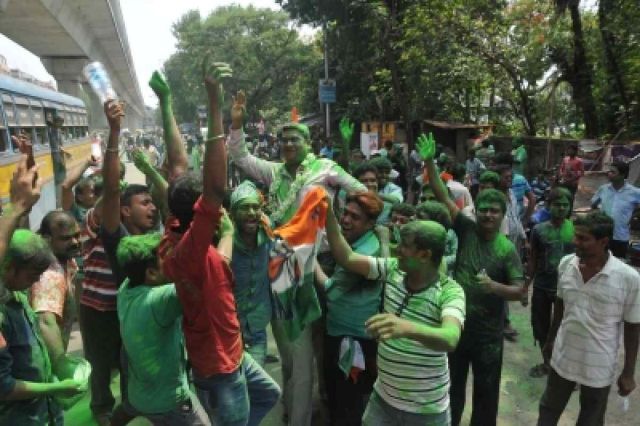
‘Bengal violence fallout of economic clashes and ruling party aggression’
Kolkata : Dearth of effective employment, aggressive political campaigns and a common tendency of the ruling parties to throttle the voice of the opposition are the major factors in the culture of political violence in West Bengal, say experts and politicians.
Despite being largely free from caste conflicts and sectarian strife, the state has for decades topped the chart in political clashes which have left hundreds dead and maimed and caused loss of property worth crores of rupees.
While Prime Minister Narendra Modi’s denunciation of the widespread violence and killings focussed around the state rural polls as “murder of democracy” has brought the malady more into national limelight, analysts feel the recent political disturbances — in which at least 22 people have died since the start of the poll process — are no flash-in-the-pan happenings.
Political science teacher Udayan Bandopadhyay termed the violence in Bengal as a by-product of unemployment and over dependence of people on political parties for different governmental projects.
“People depend a lot on the local power nexus, mainly from the ruling dispensation, to get some sort of disguised employment, like the Hundred day’s work scheme (MGNREGA),” said Bandopadhyay, an associate professor in Bangabasi College.
“We are boasting over MGNREGA (the rural jobs scheme). But it proves that the state is actually the last in creating effective employment. It clearly shows that in rural areas, the state has not been able to produce anything apart from seasonal agricultural employment,” he added.
The violence that often seems like a battle of political ideologies from outside is actually driven by economic reasons in a state like West Bengal that lacks proper ways to earn livelihood.
“It has nothing to do with political ideology; these are absolutely localised clashes over the spoils. I think it will increase in terms of number of clashes and casualties in the coming days if the employment scenario in the state does not change,” Bandopadhyay claimed.
According to another political analyst, Anil Kumar Jana, violence during an election process is not just limited to Bengal but is prevalent across the country. The aggressive campaigning by the political leaders is largely responsible for this.
“Some of their actions are provoking the people more as in India a section of people still look up to the leaders. The violence in West Bengal is nothing new. But this time around, it became murkier as the election campaign by the BJP was very aggressive,” he said.
“On the other hand, the Trinamool Congress lacks political or ideological persuasion and heavily banks upon the politics of anti-establishment. So, the party’s aggression naturally flows down to the workers at the grassroot level,” said Jana, head of Vidyasagar University’s political science department.
Referring to the massive inflow of money to the panchayats, he pointed out that the competition to win is fierce because those who would come to power would be able to lay their hands on money.
The political parties blamed each other.
“Election or no election, the Trinamool has always tried to destroy the opposition. Before the rural polls the Chief Minister (Mamata Banerjee) herself implied that 100 percent seats should be won by Trinamool Congress. So the police and state administration took it as a mandate from the Chief Minister to annihilate all opposition forces. As a result, there was a series of violence by organised goons, ably aided and abetted by the police and the state administration,” said CPI-M politburo member and MP Mohammad Salim.
BJP Secretary Rahul Sinha targeted both the communists and Banerjee.
“This trend of state sponsored terrorism has been introduced in Bengal by the communists. I won’t say that violence was non-existent during the time of the Congress but it is mostly an invention of the Left regime. To address this fear of losing their support base, the CPI-M introduced a trend to throttle the opposition voices,” Sinha contended.
“This has been further promoted by Mamata who gave the hooligans an open licence. She is also openly using the police force as a part of her cadre base. More than clashes, it is mostly attacks on the opposition by the ruling party,” Sinha added.
State Congress president Adhir Chowdhury regretted that Bengal held the number one tag in political violence.
“Some places have communal tension or unrest over social, racial or religious issues but in Bengal it is a tradition to throttle the voice of the opposition through attacks and violence. Now it seems that doing politics for a party like Congress is a criminal offence,” Chowdhury maintained.
The Trinamool, however, refused to accept that political atrocities have increased during its rule.
“The violence that’s happening now is largely orchestrated by the opposition parties like BJP and CPI-M who are instigating unrest among people to show the current government in a bad light.
“Some parties are even bringing in goons from states like Jharkhand that has a more severe history of political violence than Bengal. However, the state administration is doing its best to handle the adversities,” Trinamool Secretary General Partha Chatterjee said.
(Milinda Ghosh Roy can be contacted at milinda.r@ians.in )
—IANS

